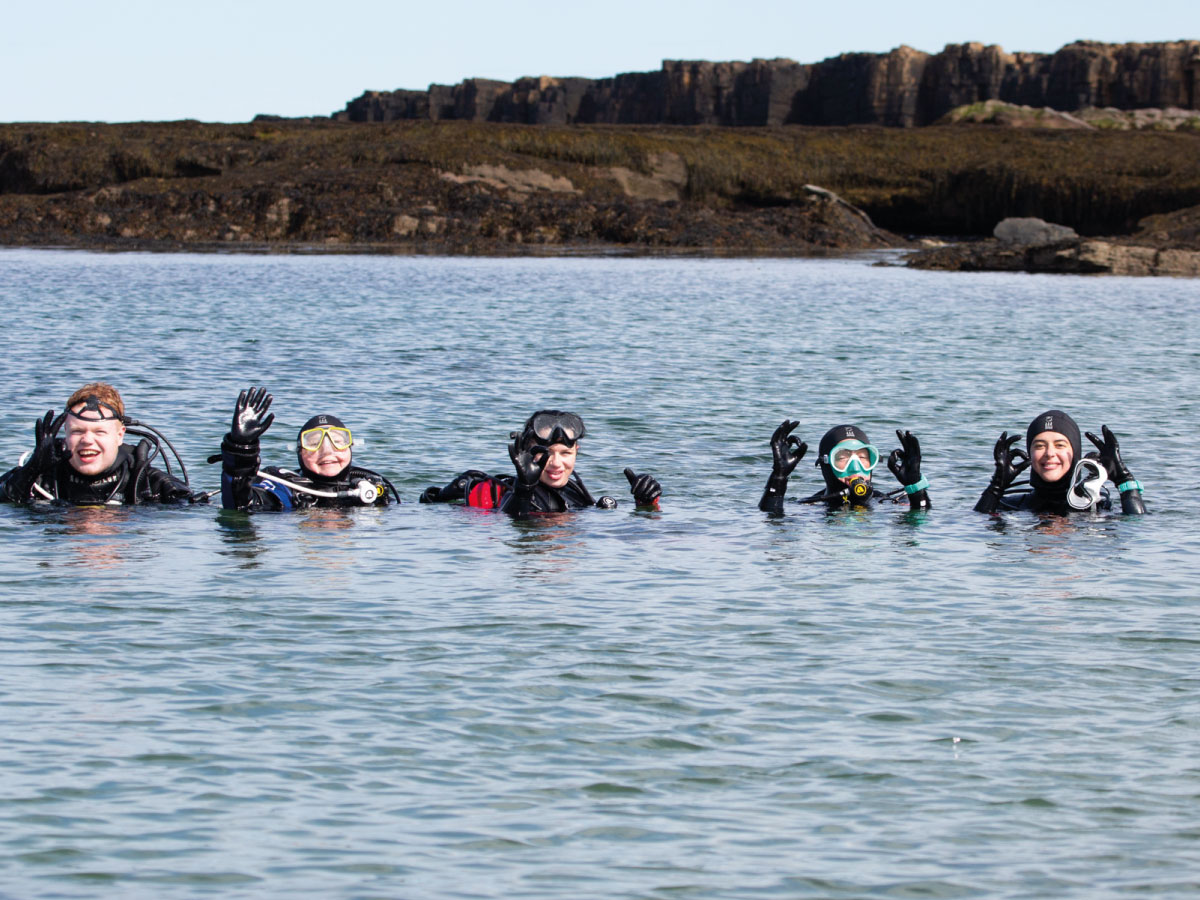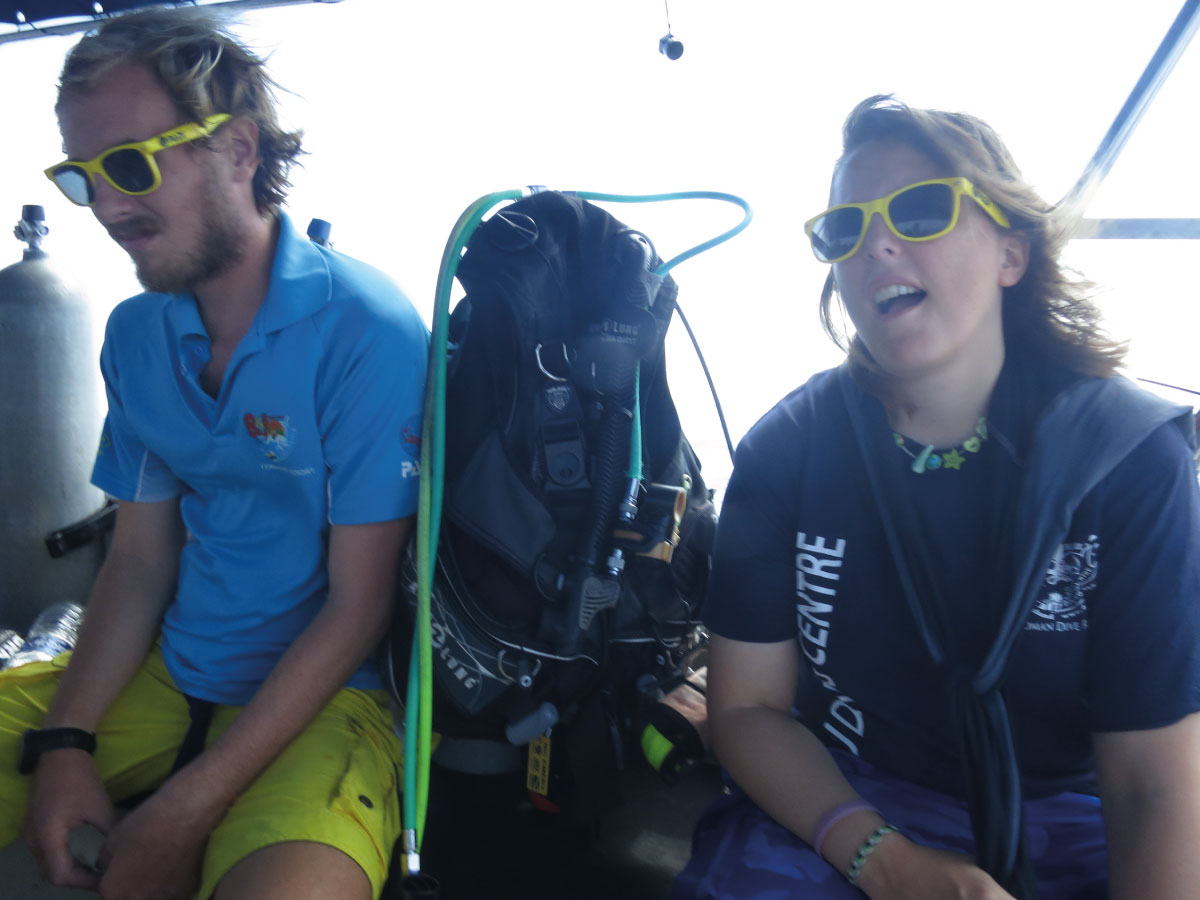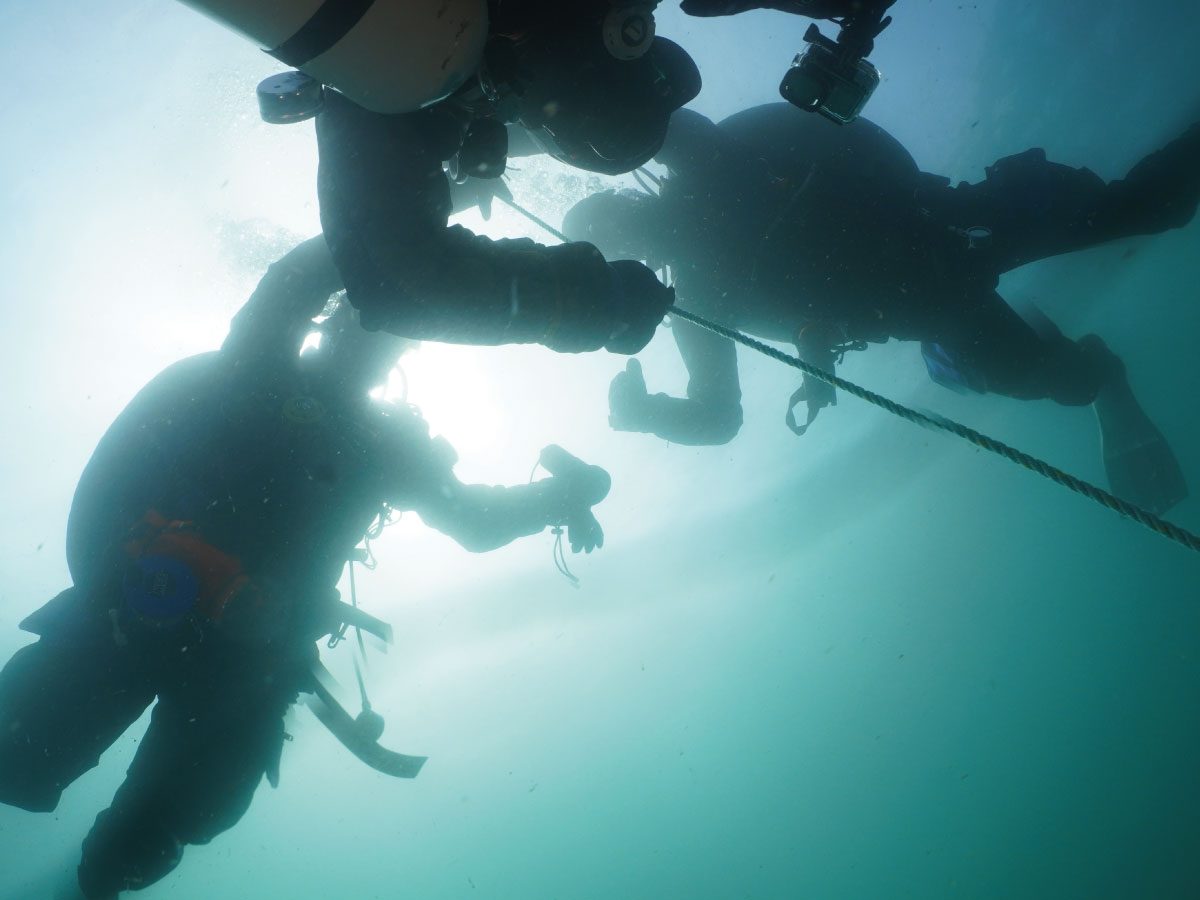HOW MUCH IS TOO MUCH FOR A DIVE PRO?
“Just make your dive pros do more dives in a day – when I had a dive shop, I’d just make my instructors do 4 or 5 dives a day so we could take more customers”
This sentence has been playing on my mind for ages. My brain keeps randomly snapping back to it for some reason. It came off the back of a discussion I had with someone fairly high up in a training agency a couple of years ago. We were talking about how I was struggling with capacity throughout the season, how we had a backlog of training that needed to be completed, and we were maxed out in terms of hours, kit and available staff.
Should I expect my team to “double-dive” as we call it. I mean, it makes business sense – I can take more divers, do more training, and ultimately make more money… but is it the right thing to do?
In this article, I’ll talk about my own experiences being expected to do this many dives in a day, what the norm for dive pros working abroad and in the UK looks like, and why I decided not to take this little nugget of advice from an industry leader.
WHAT IS DOUBLE DIVING?
Double diving is where you take your first group of divers out in the morning for their two dives, and then a brand new group joins you for another two in the afternoon. We all know there’s a PADI standard that says divers can’t complete more than 3 training dives in a day, but there’s no rules around how many a dive pro can do!
Following this logic, there’s really no limit to the amount of dives a dive pro can be asked to complete in a day. The dive centre owner can rub their hands together with dollar signs in their eyes. Of course, the reality of regular double diving is not so simple. As I’ll discuss in a minute, there’s a reason why I think this mentality has led to the burn and churn of dive pros all over the world.
WHAT DOES A TYPICAL DIVE PRO DAY LOOK LIKE IN THE UK?
When James and I first set up The Fifth Point, there was only us in the water. Before we found some teammates, we’d regularly double-dive just to try and create a little bit of extra capacity. Back then, this was easy for us. We had the novelty of a brand new business, the thrill of new customers, and the excitement of being back diving in UK waters again. We were buoyed up by enthusiasm for the new challenge.
As you can imagine, diving like this on top of all the confined sessions and businessy-type stuff we were doing during the week pretty quickly led to the shine wearing off. We realised that this way of working wasn't sustainable and as we started becoming more popular, we knew we couldn't do it alone. We stopped double diving, and decided instead to grow our team so we could have a couple of groups in the water at the same time.
A typical diving day at The Fifth Point consists of two dives for our dive pros. If we have students on courses, there might be a maximum of 3. It can occasionally happen that if one of our team is having a bad day (think drysuit flood, equalising issues, bad joojoos) someone else will jump in for them to ease the burden (the luxury of having an awesome team!) There are also lots of days where we jump in once the customers have left and have a cheeky little fun dive for ourselves.
I jokingly asked my diving peers if double diving was normal in the UK (I've not noticed it happening much in the North East, but was curious about other parts of the country).
“Is four dives a day normal for you lot daan saaf?”
“Only 4?! That’s the minimum. I did 9 one day!”
So, yeah. To say I was shocked by that is an understatement! It appears that double diving, sometimes even triple-diving or more is commonplace in the UK. This started to make sense when I considered the diving models used by lots of dive centres here - they might only have 1 or 2 days per month in open water, so it's the only way they can handle their students.

WHAT DOES A TYPICAL DIVE PRO DAY LOOK LIKE ABROAD?
Double diving when we first opened The Fifth Point didn’t feel too dissimilar to the way we worked in Malaysia. We were very accustomed to doing two morning dives, an afternoon dive and maybe even a night dive in the evening and we'd do this multiple days on the trot. We had 4 days off per month that we usually took in blocks, rather than spread them out.
The Divemasters definitely did more dives in a day than our Instructors. As they were responsible for taking care of fun divers, they were scheduled to dive as much as needed to keep the customers happy. Their maximum would probably be 5 in a day (2 morning, 2 afternoon and a night dive)
For the Instructors, it really depended on their schedule – we tried to keep them focussed on their group of students rather than being pulled out to take care of other customers. Because of standards, an Instructor would usually complete 2 or 3 dives in a day, unless they were roped in for a cheeky try dive or some guiding if we were desperate.
I’d say this is pretty normal for working in tropical destinations.
However, there is a wild card.
Liveaboards.
Hats off to every dive pro that works on a liveaboard. I think this has to be the most intense scuba diving job in existence. Liveaboard dive pros are working 24/7. It’s common to dive 5 or 6 times a day, and then on top of that, you’re entertaining your customers round the clock. With crazy early morning wake-up calls and late-night socialising, one group finishes and another boards straightaway… move over Below Deck. You’re stews and deck crews couldn’t cut it working on a liveaboard!

WHY DOUBLE DIVING IS BAD FOR DIVE PROS
I could force my team at The Fifth Point to double dive every day.
I’d make more money.
We’d complete more certs.
Am I willing to get in the water and double-dive myself?
Nope. Not anymore, those days are gone. I know for a fact it leads to burn out!
And that’s the main reason why I won’t make my team do it.
I’ve been working as a dive pro for getting on 15 years now. I’ve done the double dives, I’ve worked the crazy hours, I’ve done eat/sleep/dive/drink/repeat for lots of those years and I know it's not sustainable.
Burnt-out Instructors are dangerous.
I’ve done dives where I shouldn’t have been in the water because I was so exhausted. I was a risk to myself and my divers. When I’m burnt out, I make bad decisions, I cut corners, I lose concentration. I’ve been fortunate that it’s never bit me in the arse.
For the majority of my dive career, working abroad, I didn’t really have the safe space to speak up about how I felt. I just had to get on with it. I was extremely lucky (and still am!) to work with James so we can spread the load between us on the bad days.
I know a lot of dive pros feel this pressure to suck it up. They know that they are replaceable because of the burn and churn problem in the industry. Can’t do 6 dives a day for weeks on end with no days off? Well, there’s another eager instructor just chomping at the bit to take your place. You’re fired.
It’s really sad that the industry has ended up in this state.
In the UK, I feel like it’s even more of a problem. Our diving conditions are not the 30°c water with viz for days that our colleagues abroad enjoy. Double diving in water averaging 10 degrees and limited visibility is bloody hard work, not to mention the increased physical burden of humping heavy kit and extra weights around in drysuits. Double diving in these conditions is hardcore.
There’s another problem here though. The majority of dive pros in the UK work on a voluntary basis. They’re being whipped like dogs and they don’t even get paid for it! I see so many talented pros becoming jaded by the whole experience. They fall out of love with diving because they feel underappreciated. The thing they love most has now become a chore. They’re working their normal 9 to 5 during the week, and now they’ve got more unfulfilling work to do on the weekend.
No one should work for free – especially dive professionals who have undergone years of costly training and self-development. And no one should feel the pressure to complete an overwhelming number of dives per day for long periods of time.
WHY DOUBLE DIVING IS BAD FOR YOUR CUSTOMERS
If we take that extreme example where a dive pro was expected to complete 9 dives in a day... what on earth was that like for the customers involved?! A literal conveyor belt of divers being handed to the Instructor to bash off some skills, returned to surface cover and then new students passed in?
A dive pro under this kind of pressure is not in a position where they can deliver top-notch training. They're being forced to tea bag their students and tick boxes. We'll never be able to create competent and confident divers if this is the approach we take to their training.
Even if you're just double diving, you'll be full of beans in the morning so you'll be on form with your first set of students. But let's say it's a typical diving day, your students encounter some issues, you're concentrating, possibly task loaded, maybe over exerted. I know my energy levels would be depleted before my second group arrived. I wouldn't be as switched on, my standards would most likely drop, and I'd be getting cold!
If you're double diving, are you diminishing the customer experience? Are you giving them the best training? Is everyone having fun?

WHAT'S THE SOLUTION?
Well, as per usual when I write these types of articles, an easy solution lies in the prices charged by dive centres.
I see so many businesses running on a low cost, stack 'em high business model. They take advantage of hard-working dive pros with their free/cheap labour to try and turn a profit. There are dive centres in the UK charging less than £300 for an Open Water Course. I honestly don't know how this covers the costs associated with delivering training - even if they do get big groups. Perhaps I'm missing something (and I'm all ears if you've got the secret sauce!)
I do know that a £300 course will not include labour costs. It's just impossible. So, these hard-working dive pros, delivering courses on behalf of their dive centre are not being paid. Our Open Water courses are £895 which only turns a profit if we get 4 students, but at least we cover staff wages regardless of how many students sign up. Honestly, the price needs to be over £1k to make a reasonable profit, but if we're already 3x the cost of some... how far can we push it and still remain a market option?!
The bottom line is everyone needs to pay their team and start charging realistic prices for their diving. Profit is not a dirty word... slavery is though! Good dive pros deserve to be paid and this cost should be worked into the price of courses and fun diving. Dive centre owners are not doing you a favour by "letting you dive for free". They're abusing your enthusiasm for the sport to keep their business afloat!
Raising prices allows you to reduce group sizes, requires your staff to complete fewer dives, hire more staff, spend more time on diver training, buy new gear... it literally improves everything!
On the surface, it might make perfect business sense to get your team double diving to make more money. It might be the norm. It might even be what your mentors suggest to help you be more successful.
Don’t be normal.
Having a team who are not burnt out, who are on the ball, who feel appreciated and earn money, who are happy and working together is worth a million times more than shoehorning in another customer who in reality isn't paying enough for the amazing experiences you offer them.
Come on diving industry, we can do better!
Sounds about right…volunteered for a centre for around 4 years…. and yeah done the whole 8/9 dives as a dm when they were short! Nipped out to run to bathroom and grab a quick drink(not at the same time ) apart from that, bobbed like a seal for the day! Got a bit of kit discount but not paid and it was every weekend. As a new pro it was gaining experience and all that… but costs were definitely higher than the discounts gained… also volunteered working the store when not diving, experiences gained but again, Costs outweigh there too. Discounts dont exceed the working time either. Had to move away from the area but if ever went back home to local area and went to say hello there was no discount to be had and it was not the same atmosphere… maybe they were upset they lost a great pro
Another reflective blog Nic – totally agree on the UK pricing. We charge in the same ball park and with pretty much 1:1 on courses get bugger all out of it financially. The self pressure therefore to dive more in a day can be immense and that’s all on me with no one else forcing my hand.